Every day, millions of people receive dozens of unsolicited commercial e-mails known popularly as spam. Some users see spam as a minor annoyance, while others are so overwhelmed with spam that they are forced to switch e-mail addresses. The thing that attracts the most spam is the e-mail addresses posted on Web sites or in newsgroups. Some spam is generated through attacks on mail servers, methods that don't rely on the collection of e-mail addresses at all.
One sneaky culprit is the spyware. Spyware is a small script placed on our computer, usually without our knowledge, during software download operations, that tracks our movement on the Internet. The problem is that spyware also has the ability to collect and send all the personal information that's on our computer including our email address to unknown people, all without our knowledge. Spyware can also get into our computer via cookies, which are bits of data placed on our PC by websites that can be used to track our behavior and identity online.
Even after removing the cookies, the spyware can remain and continue to track our movements on the Internet.
Cookies were originally intended to make our life easier on the net. They remember things like passwords or the date of our last visit and put this information in a short line of code called a 'cookie' in a directory called 'temporary internet files' on our computer. But to the spammer, the opportunity to place a cookie on our computer is an opportunity to invade our privacy which they don't have the right to do that. Malicious cookies can be data miners, which look through our computer for items of interest to the spammer, like more addresses, or they can access our net history and allow the spammer to see what...


